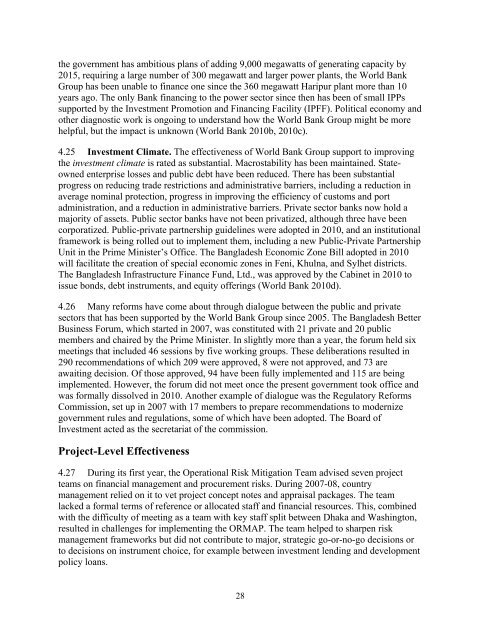Bangladesh - Independent Evaluation Group - World Bank
Bangladesh - Independent Evaluation Group - World Bank
Bangladesh - Independent Evaluation Group - World Bank
Create successful ePaper yourself
Turn your PDF publications into a flip-book with our unique Google optimized e-Paper software.
the government has ambitious plans of adding 9,000 megawatts of generating capacity by<br />
2015, requiring a large number of 300 megawatt and larger power plants, the <strong>World</strong> <strong>Bank</strong><br />
<strong>Group</strong> has been unable to finance one since the 360 megawatt Haripur plant more than 10<br />
years ago. The only <strong>Bank</strong> financing to the power sector since then has been of small IPPs<br />
supported by the Investment Promotion and Financing Facility (IPFF). Political economy and<br />
other diagnostic work is ongoing to understand how the <strong>World</strong> <strong>Bank</strong> <strong>Group</strong> might be more<br />
helpful, but the impact is unknown (<strong>World</strong> <strong>Bank</strong> 2010b, 2010c).<br />
4.25 Investment Climate. The effectiveness of <strong>World</strong> <strong>Bank</strong> <strong>Group</strong> support to improving<br />
the investment climate is rated as substantial. Macrostability has been maintained. Stateowned<br />
enterprise losses and public debt have been reduced. There has been substantial<br />
progress on reducing trade restrictions and administrative barriers, including a reduction in<br />
average nominal protection, progress in improving the efficiency of customs and port<br />
administration, and a reduction in administrative barriers. Private sector banks now hold a<br />
majority of assets. Public sector banks have not been privatized, although three have been<br />
corporatized. Public-private partnership guidelines were adopted in 2010, and an institutional<br />
framework is being rolled out to implement them, including a new Public-Private Partnership<br />
Unit in the Prime Minister’s Office. The <strong>Bangladesh</strong> Economic Zone Bill adopted in 2010<br />
will facilitate the creation of special economic zones in Feni, Khulna, and Sylhet districts.<br />
The <strong>Bangladesh</strong> Infrastructure Finance Fund, Ltd., was approved by the Cabinet in 2010 to<br />
issue bonds, debt instruments, and equity offerings (<strong>World</strong> <strong>Bank</strong> 2010d).<br />
4.26 Many reforms have come about through dialogue between the public and private<br />
sectors that has been supported by the <strong>World</strong> <strong>Bank</strong> <strong>Group</strong> since 2005. The <strong>Bangladesh</strong> Better<br />
Business Forum, which started in 2007, was constituted with 21 private and 20 public<br />
members and chaired by the Prime Minister. In slightly more than a year, the forum held six<br />
meetings that included 46 sessions by five working groups. These deliberations resulted in<br />
290 recommendations of which 209 were approved, 8 were not approved, and 73 are<br />
awaiting decision. Of those approved, 94 have been fully implemented and 115 are being<br />
implemented. However, the forum did not meet once the present government took office and<br />
was formally dissolved in 2010. Another example of dialogue was the Regulatory Reforms<br />
Commission, set up in 2007 with 17 members to prepare recommendations to modernize<br />
government rules and regulations, some of which have been adopted. The Board of<br />
Investment acted as the secretariat of the commission.<br />
Project-Level Effectiveness<br />
4.27 During its first year, the Operational Risk Mitigation Team advised seven project<br />
teams on financial management and procurement risks. During 2007-08, country<br />
management relied on it to vet project concept notes and appraisal packages. The team<br />
lacked a formal terms of reference or allocated staff and financial resources. This, combined<br />
with the difficulty of meeting as a team with key staff split between Dhaka and Washington,<br />
resulted in challenges for implementing the ORMAP. The team helped to sharpen risk<br />
management frameworks but did not contribute to major, strategic go-or-no-go decisions or<br />
to decisions on instrument choice, for example between investment lending and development<br />
policy loans.<br />
28

















